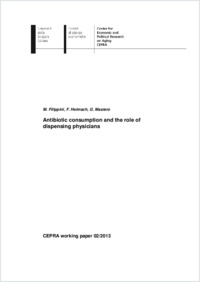Antibiotic consumption and the role of dispensing physicians
- Filippini, Massimo Istituto di economia politica (IdEP), Facoltà di scienze economiche, Università della Svizzera italiana, Svizzera
- Heimsch, Fabian ETH, Zurich, Switzerland
- Masiero, Giuliano Istituto di economia politica (IdEP), Facoltà di scienze economiche, Università della Svizzera italiana, Svizzera
-
2013
34 p
English
Regulation of prescription and dispensing of antibiotics has a twin purpose: to enhance access to antibiotic treatment and to reduce inappropriate use of drugs. Nevertheless, incentives on antibiotics to dispensing physicians may lead to inefficiencies. We model the interaction between competing physicians (with and without dispensing of drugs) and patients exposed to bacterial infections when antibiotic treatment generates spatial consumption externalities. Then, we empirically investigate the impact of dispensing practices on antibiotic consumption by means of combined spatial-lag and spatial-error econometric estimators for panel data (SARAR). The investigation exploits data from small geographic areas in a country where both regimes - with and without dispensing physicians - are possible. We find evidence that dispensing practices increase antibiotic use after controlling for determinants of demand and access, and spatial effects. This suggests that health authorities have a margin to adjust economic incentives on dispensing practices in order to reduce antibiotic misuse.
- Language
-
- English
- Classification
- Economics
- License
-
License undefined
- Open access status
- green
- Identifiers
-
- RERO DOC 31703
- ARK ark:/12658/srd1318440
- Persistent URL
- https://n2t.net/ark:/12658/srd1318440
Statistics
Document views: 214
File downloads:
- Texte intégral: 222
